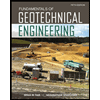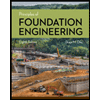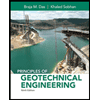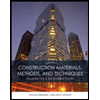= Q1. After applying for all corresponding permits with the local government, a neighborhood association built an artificial pond so the neighbors could enjoy swimming and sailing during the scorching summer months (see Fig. 1). If the unit weight of the reinforced concrete used to build the vertical retaining wall is Yc 24 kN/m³, find the stress distribution diagram beneath the retaining wall. Assume that the friction on the bottom surface of the retaining wall prevents sliding. A smooth plastering was applied on the vertical wall to create an impermeable barrier against water filtration. Note that the pond's water level does not reach the top of the retaining wall due to the installation of an overflow drainage system. Overturning of the retaining wall 1 m 1 m Overflow drainage system 4 m Retaining wall A 2.5 m Figure 1 Neighborhood artificial pond Yw = 9.8 kN/m³ Original ground w Q2. After several years of summer fun, and with the corresponding government licenses, the association filled the pond with a horizontal compacted cohesionless backfill so that new houses could be built on the newly developed area (see Fig. 2). Assume that the original smooth vertical surface of the retaining wall and the drainage system were kept the same so that no friction occurs between the wall and the backfill. The water table can only rise to the original water level of the pond. Find the stress distribution diagram beneath the retaining wall during both (i) dry and (ii) rainy seasons. For the dry season, assume that the water table drops far below the base of the wall. Compare and discuss the results obtained from (1). Overturning of the retaining wall 1 m 1 m Overflow drainage 1... system 4 m Retaining wall Compacted cohesionless backfill Yt=15.5 kN/m³ = Ysat 19.0 kN/m³ s = 35° S A 2.5 m Figure 2.2 Water table during rainy season Original ground
= Q1. After applying for all corresponding permits with the local government, a neighborhood association built an artificial pond so the neighbors could enjoy swimming and sailing during the scorching summer months (see Fig. 1). If the unit weight of the reinforced concrete used to build the vertical retaining wall is Yc 24 kN/m³, find the stress distribution diagram beneath the retaining wall. Assume that the friction on the bottom surface of the retaining wall prevents sliding. A smooth plastering was applied on the vertical wall to create an impermeable barrier against water filtration. Note that the pond's water level does not reach the top of the retaining wall due to the installation of an overflow drainage system. Overturning of the retaining wall 1 m 1 m Overflow drainage system 4 m Retaining wall A 2.5 m Figure 1 Neighborhood artificial pond Yw = 9.8 kN/m³ Original ground w Q2. After several years of summer fun, and with the corresponding government licenses, the association filled the pond with a horizontal compacted cohesionless backfill so that new houses could be built on the newly developed area (see Fig. 2). Assume that the original smooth vertical surface of the retaining wall and the drainage system were kept the same so that no friction occurs between the wall and the backfill. The water table can only rise to the original water level of the pond. Find the stress distribution diagram beneath the retaining wall during both (i) dry and (ii) rainy seasons. For the dry season, assume that the water table drops far below the base of the wall. Compare and discuss the results obtained from (1). Overturning of the retaining wall 1 m 1 m Overflow drainage 1... system 4 m Retaining wall Compacted cohesionless backfill Yt=15.5 kN/m³ = Ysat 19.0 kN/m³ s = 35° S A 2.5 m Figure 2.2 Water table during rainy season Original ground
Principles of Foundation Engineering (MindTap Course List)
9th Edition
ISBN:9781337705028
Author:Braja M. Das, Nagaratnam Sivakugan
Publisher:Braja M. Das, Nagaratnam Sivakugan
Chapter2: Geotechnical Properties Of Soil
Section: Chapter Questions
Problem 2.10P: The soil profile at a site consists of 10 m of gravelly sand underlain by a soft clay layer. The...
Related questions
Question
I need detailed help solving this exercise from homework of Foundation Engineering.
I do not really understand how to do, please do it step by step, not that long but clear. Thank you!

Transcribed Image Text:=
Q1. After applying for all corresponding permits with the local government, a neighborhood association built an artificial
pond so the neighbors could enjoy swimming and sailing during the scorching summer months (see Fig. 1). If the unit weight
of the reinforced concrete used to build the vertical retaining wall is Yc 24 kN/m³, find the stress distribution diagram
beneath the retaining wall. Assume that the friction on the bottom surface of the retaining wall prevents sliding. A smooth
plastering was applied on the vertical wall to create an impermeable barrier against water filtration. Note that the pond's water
level does not reach the top of the retaining wall due to the installation of an overflow drainage system.
Overturning of the
retaining wall
1 m
1 m
Overflow
drainage
system
4 m
Retaining
wall
A
2.5 m
Figure 1
Neighborhood
artificial pond
Yw = 9.8 kN/m³
Original ground w
Q2. After several years of summer fun, and with the corresponding government licenses, the association filled the pond with
a horizontal compacted cohesionless backfill so that new houses could be built on the newly developed area (see Fig. 2).
Assume that the original smooth vertical surface of the retaining wall and the drainage system were kept the same so that no
friction occurs between the wall and the backfill. The water table can only rise to the original water level of the pond. Find
the stress distribution diagram beneath the retaining wall during both (i) dry and (ii) rainy seasons. For the dry season, assume
that the water table drops far below the base of the wall. Compare and discuss the results obtained from (1).
Overturning of the
retaining wall
1 m
1 m
Overflow
drainage
1...
system
4 m
Retaining
wall
Compacted
cohesionless
backfill
Yt=15.5 kN/m³
=
Ysat 19.0 kN/m³
s = 35°
S
A
2.5 m
Figure 2.2
Water table during
rainy season
Original ground
Expert Solution
This question has been solved!
Explore an expertly crafted, step-by-step solution for a thorough understanding of key concepts.
Step by step
Solved in 2 steps with 1 images

Recommended textbooks for you

Principles of Foundation Engineering (MindTap Cou…
Civil Engineering
ISBN:
9781337705028
Author:
Braja M. Das, Nagaratnam Sivakugan
Publisher:
Cengage Learning

Fundamentals of Geotechnical Engineering (MindTap…
Civil Engineering
ISBN:
9781305635180
Author:
Braja M. Das, Nagaratnam Sivakugan
Publisher:
Cengage Learning

Principles of Foundation Engineering (MindTap Cou…
Civil Engineering
ISBN:
9781305081550
Author:
Braja M. Das
Publisher:
Cengage Learning

Principles of Foundation Engineering (MindTap Cou…
Civil Engineering
ISBN:
9781337705028
Author:
Braja M. Das, Nagaratnam Sivakugan
Publisher:
Cengage Learning

Fundamentals of Geotechnical Engineering (MindTap…
Civil Engineering
ISBN:
9781305635180
Author:
Braja M. Das, Nagaratnam Sivakugan
Publisher:
Cengage Learning

Principles of Foundation Engineering (MindTap Cou…
Civil Engineering
ISBN:
9781305081550
Author:
Braja M. Das
Publisher:
Cengage Learning

Principles of Geotechnical Engineering (MindTap C…
Civil Engineering
ISBN:
9781305970939
Author:
Braja M. Das, Khaled Sobhan
Publisher:
Cengage Learning

Construction Materials, Methods and Techniques (M…
Civil Engineering
ISBN:
9781305086272
Author:
William P. Spence, Eva Kultermann
Publisher:
Cengage Learning